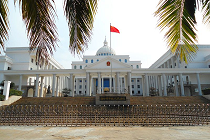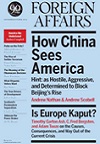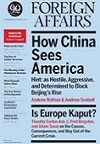Book review: Our Moon Has Blood Clots
D. P. Satish in his review of Rahul Pandita’s latest book writes that it is a bold attempt at voicing despair about a nation that mouths lofty platitudes but does little to protect its persecuted communities.
 Courtesy:
Courtesy:
D. P. Satish in his review of Rahul Pandita’s latest book writes that it is a bold attempt at voicing despair about a nation that mouths lofty platitudes but does little to protect its persecuted communities.
 Courtesy: Foreign Affairs
Courtesy: Foreign Affairs
The U.S. has continually been trying to coerce Iran into giving up its nuclear program for years now, but with little success. What should Washington do to avoid both military action, and deterrence?
 Courtesy: Foreign Affairs
Courtesy: Foreign Affairs
In the next decade, China will continue to rise, not fade. Its leaders will consolidate the one-party model and, in the process, challenge the West’s smug certainty about political development and the inevitable march toward electoral democracy.
The Obama administration plans to restrain Chinese belligerence by reinforcing U.S. military and diplomatic links to the Asia-Pacific. However, in order to avoid further Chinese resistance to its policies, the U.S. must look for possible avenues of cooperation with the country.

Over the past several years, the most talked-about trend in the global economy has been the so-called rise of the rest, which saw the economies of many developing countries swiftly converging with those of their more developed peers. The primary Read more
 Courtesy: Foreign Affairs
Courtesy: Foreign Affairs
There’s been much talk about the “the rise of the rest,” with Brazil, Russia, India, and China leading the charge. However, few countries can sustain unusually fast growth for a decade, and even fewer, for more than that. As the boom years begin to end, the international order won’t change as much as expected.
 Courtesy: Anna Frodesiak/WikimediaCommons
Courtesy: Anna Frodesiak/WikimediaCommons
China's legal system is more formalized and better functioning than many realize. Still, given the Chinese Communist Party's lock on judicial power, the country still has work to do.
 Courtesy: Foreign Affairs
Courtesy: Foreign Affairs
Jeffrey D. Sachs argues that the mono-causal analysis of the book, 'Why Nations Fail,’ – that economic development hinges on a country’s political institutions – ignores important factors (such as geography) that can also affect growth.
 Courtesy: Th3r0/Flickr
Courtesy: Th3r0/Flickr
The Japanese purchase of the Diaoyu Islands is bound to have a negative impact on China-Japan relations. If these tensions in the East China Sea persist, regional business ties and especially China-Japan economies ties - a whopping $345 billion in two-way trade - will take a hit.
 Courtesy: Foreign Affairs
Courtesy: Foreign Affairs
Since weak demand is at the heart of the recession, governments need to enact stimulus programs along with structural reforms, argues Menzie Chinn. Structural reforms don’t always work out, writes Karl Smith. Raghuram Rajan demurs.